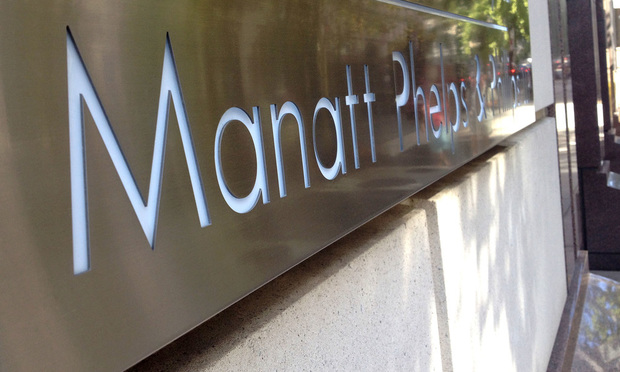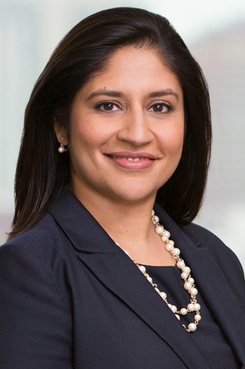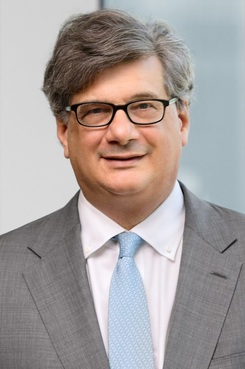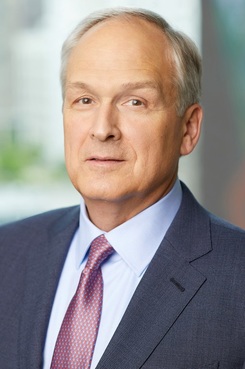With Its Consultants' Help, Manatt Seeks to Upend Health Care Services
Manatt Health, which employs 70 consultants and 90 lawyers, has been undergoing a similar change as its health care clients: Moving from a fee-for-services model to a value-based billing system.
August 22, 2018 at 04:56 PM
8 minute read

When Thomas Enders joined Manatt, Phelps & Phillips' health care practice about eight years ago, he was often referred to as an “attorney equivalent.” Outside of a law firm, he would be better known as a consultant.
Where he came from, Computer Sciences Corp., Enders had led the eastern region consulting practice for the company's health care providers. He may have seemed out of place at Manatt Phelps back in 2011, but his colleagues' vernacular has changed as the health care practice grew over the years into an interdisciplinary team with about 70 consultants and 90 lawyers.
“Now, we're all called professionals,” said Enders, who serves as senior managing director of Manatt Health. “It's really a transition to a professional service firm, which I find really powerful.”
Manatt Phelps has spent more than 10 years building this interdisciplinary practice, which Chambers and Partners calls “unique,” with an eye toward upending the competition among health care legal services providers. The firm's consultants, which often contract with C-suites and boardrooms, provide business advisory, financial, information technology, data analytics and clinical support.
The practice brings in about $110 million in annual revenue, which is generated about pound-for-pound between two types of professional head count (44 percent consultants, 56 percent lawyers), said William Bernstein, chair of Manatt Health. Last year, Manatt Phelps took in $316.9 million in gross revenue, good enough for No. 109 in the Am Law Second Hundred.
 Fatema Zanzi
Fatema ZanziManatt Phelps is now expanding its health care practice into Chicago, a city rich with health care-focused legal talent at firms like Polsinelli; McDermott Will & Emery; and Drinker Biddle & Reath.
The most recent hire by Manatt Phelps in the Windy City is Fatema Zanzi, a former consultant and Drinker Biddle partner who on Wednesday joined the firm's health care group. Zanzi's move follows the arrival in April of her former Drinker Biddle health care colleagues Keith Anderson and Linda Moroney. At the time, Manatt Health also hired former consultant Shannon Lorbiecki from Navigant as a director.
Manatt Phelps' investment in this multidisciplinary team is a bet that health care providers, in a period of profound change, need more than strictly legal advice. They also need strategy help as they reconfigure their business from a fee-for-services model to a value-based payment system. Manatt Health is an example of how a law firm can respond to a similar challenge.
About 70 percent of the unit's work is handled on a project-billed basis, rather than the billable hour, said Bernstein, adding that the transition has been helped by the consultants working alongside Manatt Phelps' lawyers.
“I always joke that I relate it to what's happening with doctors and value-based billing: If you pay doctors fee-for-services, doctors cut. If you pay lawyers hourly, lawyers bill,” Bernstein said.
 William Bernstein
William BernsteinThe health care market is an increasingly important battleground for many firms. Since the 2010 passage of the Patient Protection and Affordable Care Act, the industry has experienced a wave of consolidation that has yet to crest.
From 2016 to 2017, global health care M&A deal values rose 27 percent, to $332 billion, while deal count increased 16 percent, according to a recent report by management consultancy Bain & Co. That robust activity should continue in 2018, the report said, in part because private equity has targeted the sector. Private equity deal value last year reached its highest level in the health care industry since 2007.
McDermott's health care M&A practice, which is led by Chicagoan John Callahan, handled more private equity transactions in the space, 53, than any other law firm in 2017, according to PitchBook Data. McDermott was trailed by many typical players in the private equity space: Ropes & Gray, Kirkland & Ellis, Goodwin Proctor and DLA Piper. Consolidation has also led to a series of antitrust challenges to hospital mergers.
Manatt Phelps is not the first firm to target Chicago's health care market in recent years. Polsinelli came into the market in 2008, hiring former Foley & Lardner partner Matthew Murer, who now leads a nationwide practice of about 130 lawyers with nearly 30 in Chicago. Polsinelli is also known for working on a flat fee or alternative billing arrangement. (Murer did not respond to a request for comment.)
Drinker Biddle, for its part, has also created subsidiaries to offer nonlegal services to health care clients, said John D'Andrea, vice chair of the firm's health care group. The firm's Innovative Health Strategies business offers consultants to help health care providers make large purchases. The firm has also offered flat fee services, partnering with an academic medical center for the past 20 years on an annual fee basis, D'Andrea said.
“In this era of health care reform and the Affordable Care Act where hospitals are being asked to do more with less, hospitals are looking for partners in that,” D'Andrea said. “A lot of firms are doing it; some to greater or lesser success, I'm sure.”
 Keith Anderson
Keith AndersonStill, Keith Anderson, who left Drinker Biddle in April for Manatt Phelps, said that his new firm's integrated consulting services were transformative for his strategic transactions practice, which often counsels health care providers on M&A deals.
“It's more than the ability to be a lawyer. You need the strategy piece,” Anderson said. “And to be able to bring strategy and analytics and execution all together in one place with an integrated team—that, to me, was sort of a game-changer.”
Moroney, who joined Manatt Phelps with Anderson, said the duo have not yet been engaged directly with the firm's consultants but had projects “in the pipeline” that would benefit from its other service providers.
“There are other law firms that are on the cusp of making changes like this,” Moroney said. “And maybe they've dipped a toe in the water, but not just as enthusiastically and comprehensively and eyes wide open as the way Manatt has done it. And they're using it in a way to not just venture with trepidation into this new world but to go all in. Let's do it together, regardless of what labels we're going to throw on this.”
Zanzi, Manatt Phelps' most recent hire, said she was eager to provide flat-fee billing services to clients that the firm has with the help of a data analytics team that scopes legal work in a manner similar to how consultants have billed for years.
“I feel that's where the legal industry needs to get to,” Zanzi said. “Our clients are requesting much more certainty in the type of bills they receive.”
Having lawyers and consultants work on a level playing field can be difficult, Bernstein said. But the leader of Manatt Phelps' health care group said the two types of professionals work together well, in part, because the firm applies the same compensation system for consultants and partners. Management decisions for the group are also made by both lawyers and consultants.
“You don't have the consultants feeling like they're reporting to the lawyers,” Bernstein said. “Frankly, the biggest thing, and this just builds over time, is when people actually work together on projects and see the skills they have and understand the skill sets differently, they get excited about working with each other.”
Some of the high-profile professionals Manatt Phelps has hired include Chiquita Brooks-LaSure, a former top official at the U.S. Department of Health and Human Services (DHHS) who helped implement the Affordable Care Act; Dr. Ben Chu, a former executive vice president for the Kaiser Foundation and Health Plan Inc.; and Cindy Mann, former deputy administrator and director of the Center for Medicaid and CHIP Services at the DHHS.
Bernstein said Manatt Phelps hopes to recruit about 15 professionals—lawyers and consultants—to its Chicago office. The firm will be competing for talent with both top law firms and consultancies, such as Deloitte and McKinsey & Co. Inc., Bernstein said. He said Manatt Phelps' success to date of integrating consultants with lawyers has made it somewhat easier to convince consultants to work alongside a law firm.
“The hardest part of this, when it was just an idea, was convincing some of the early consultants to come and take a chance,” Bernstein said. “They came with the fear that they would end up as second-class citizens. And we've overcome that fear.”
This content has been archived. It is available through our partners, LexisNexis® and Bloomberg Law.
To view this content, please continue to their sites.
Not a Lexis Subscriber?
Subscribe Now
Not a Bloomberg Law Subscriber?
Subscribe Now
NOT FOR REPRINT
© 2025 ALM Global, LLC, All Rights Reserved. Request academic re-use from www.copyright.com. All other uses, submit a request to [email protected]. For more information visit Asset & Logo Licensing.
You Might Like
View All
U.S.- China Trade War: Lawyers and Clients Left 'Relying on the Governments to Sort This Out'

DeepSeek Isn’t Yet Impacting Legal Tech Development. But That Could Soon Change.
6 minute read
From Laggards to Tech Founders: Law Firm Innovation Is Flourishing

Government Contracting Clients Look to Firms to Stay on Top of Trump Policy Changes
4 minute readTrending Stories
Who Got The Work
J. Brugh Lower of Gibbons has entered an appearance for industrial equipment supplier Devco Corporation in a pending trademark infringement lawsuit. The suit, accusing the defendant of selling knock-off Graco products, was filed Dec. 18 in New Jersey District Court by Rivkin Radler on behalf of Graco Inc. and Graco Minnesota. The case, assigned to U.S. District Judge Zahid N. Quraishi, is 3:24-cv-11294, Graco Inc. et al v. Devco Corporation.
Who Got The Work
Rebecca Maller-Stein and Kent A. Yalowitz of Arnold & Porter Kaye Scholer have entered their appearances for Hanaco Venture Capital and its executives, Lior Prosor and David Frankel, in a pending securities lawsuit. The action, filed on Dec. 24 in New York Southern District Court by Zell, Aron & Co. on behalf of Goldeneye Advisors, accuses the defendants of negligently and fraudulently managing the plaintiff's $1 million investment. The case, assigned to U.S. District Judge Vernon S. Broderick, is 1:24-cv-09918, Goldeneye Advisors, LLC v. Hanaco Venture Capital, Ltd. et al.
Who Got The Work
Attorneys from A&O Shearman has stepped in as defense counsel for Toronto-Dominion Bank and other defendants in a pending securities class action. The suit, filed Dec. 11 in New York Southern District Court by Bleichmar Fonti & Auld, accuses the defendants of concealing the bank's 'pervasive' deficiencies in regards to its compliance with the Bank Secrecy Act and the quality of its anti-money laundering controls. The case, assigned to U.S. District Judge Arun Subramanian, is 1:24-cv-09445, Gonzalez v. The Toronto-Dominion Bank et al.
Who Got The Work
Crown Castle International, a Pennsylvania company providing shared communications infrastructure, has turned to Luke D. Wolf of Gordon Rees Scully Mansukhani to fend off a pending breach-of-contract lawsuit. The court action, filed Nov. 25 in Michigan Eastern District Court by Hooper Hathaway PC on behalf of The Town Residences LLC, accuses Crown Castle of failing to transfer approximately $30,000 in utility payments from T-Mobile in breach of a roof-top lease and assignment agreement. The case, assigned to U.S. District Judge Susan K. Declercq, is 2:24-cv-13131, The Town Residences LLC v. T-Mobile US, Inc. et al.
Who Got The Work
Wilfred P. Coronato and Daniel M. Schwartz of McCarter & English have stepped in as defense counsel to Electrolux Home Products Inc. in a pending product liability lawsuit. The court action, filed Nov. 26 in New York Eastern District Court by Poulos Lopiccolo PC and Nagel Rice LLP on behalf of David Stern, alleges that the defendant's refrigerators’ drawers and shelving repeatedly break and fall apart within months after purchase. The case, assigned to U.S. District Judge Joan M. Azrack, is 2:24-cv-08204, Stern v. Electrolux Home Products, Inc.
Featured Firms
Law Offices of Gary Martin Hays & Associates, P.C.
(470) 294-1674
Law Offices of Mark E. Salomone
(857) 444-6468
Smith & Hassler
(713) 739-1250










